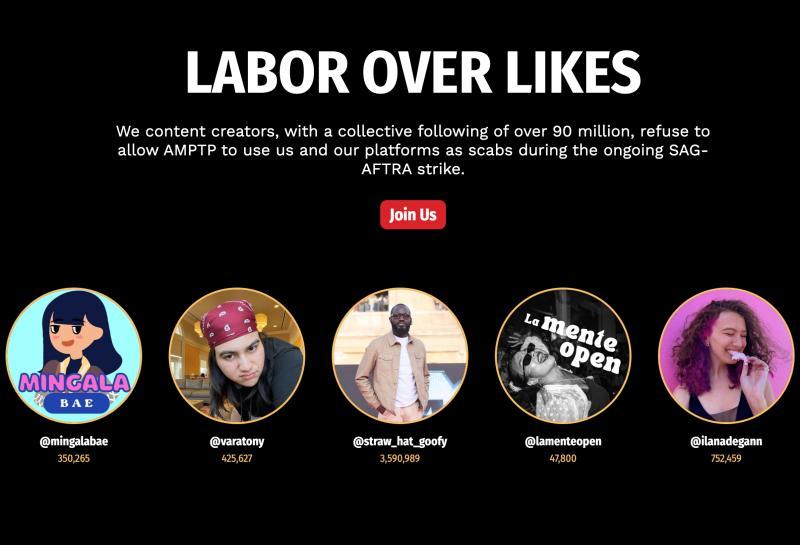Curator's Note

In July 2023—two months after the WGA went on strike and days after SAG-AFTRA joined them—discourse began to circulate about whether or not content creators should cross the picket line by promoting struck companies. Some creators argued that, since they were not members, they should not be held to guild rules. Others publicly (and, arguably, performatively) agreed with the official stance, even creating their own solidarity pledges.
Labor Over Likes was founded by Gen-Z For Change Director Victoria Hammett, pledging “We content creators, with a collective following of over 90 million, refuse to allow AMPTP to use us and our platforms as scabs during the ongoing SAG-AFTRA strike.” In their pledge, they argue corporations “have sought to undermine the [labor] movement by enlisting influencers to promote their projects.” While true, exploiting “amateur” content creators like influencers, fan artists, interns, etc., for promotion is not a recent pivot in light of work stoppage; it has been a useful strategy to lower promotion costs, increase market penetration, and reach desirable demographics for decades. Terms like “influencer” may be new, but weaponizing the aspirational labor of “amateur” creators to promote media properties is not.
However, corporations are not alone in using that liminality. As outlined in their strike rules, “it has long been the WGAW and WGAE policy to ban from future membership any non-member who performs writing services for struck companies.” Though useful in securing solidarity, these policies leverage the same aspirational labor that corporations have been exploiting: if creators hope to one day join the guilds, they cannot work during the strike.
In addition to signing the pledge, Labor Over Love invites allies to donate to strike funds like the Entertainment Community Fund. These funds provide essential aid to people who have been impacted by the strikes—but only if they qualify as “professionals.” Despite being held to the same rules, content creators stopping work with/for struck companies out of solidarity (and/or fear of being banned) are generally classified as “amateurs” and ineligible for aid. Though SAG-AFTRA began recognizing influencers in 2021, content creators are still largely disenfranchised by their liminal professional status as media workers.
What started as a pledge to demonstrate solidarity, in fact, highlights the hierarchical divisions and messy boundaries of contemporary media labor organizations. In this moment when it proves so essential, can the guilds find a way to extend that same solidarity to content creators?
Add new comment